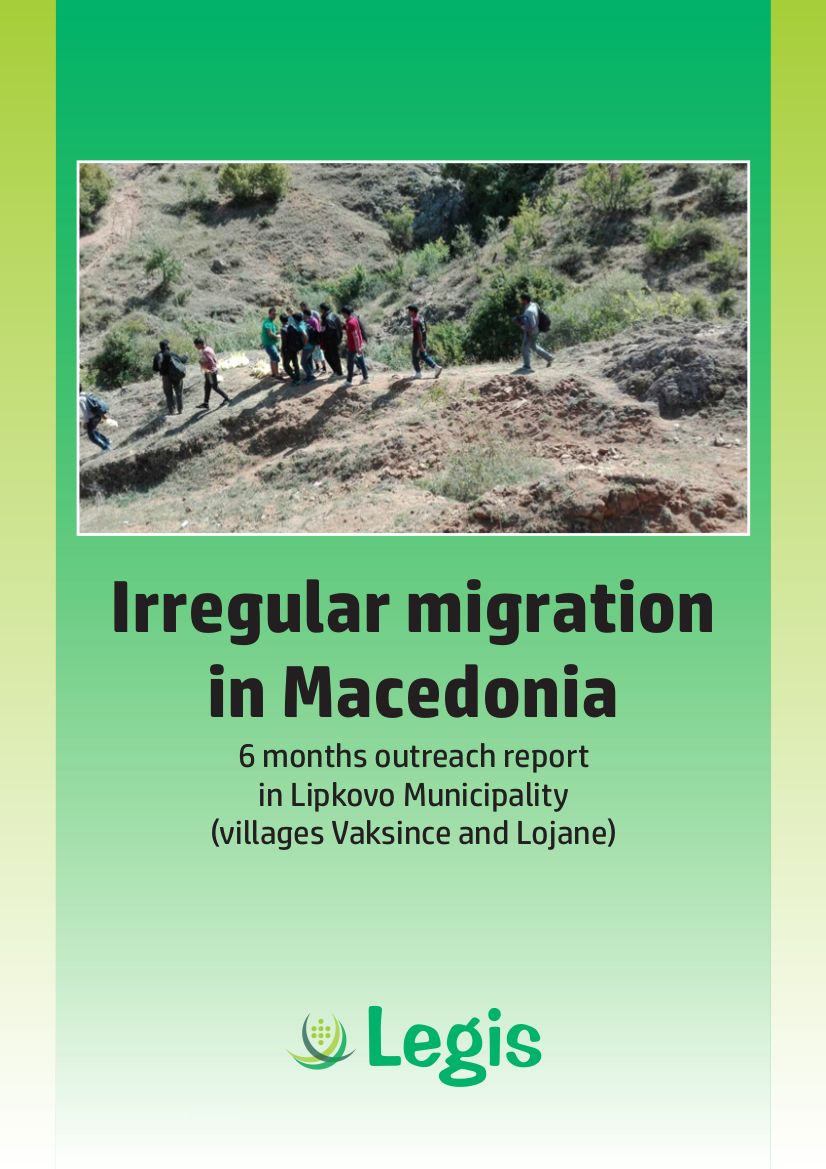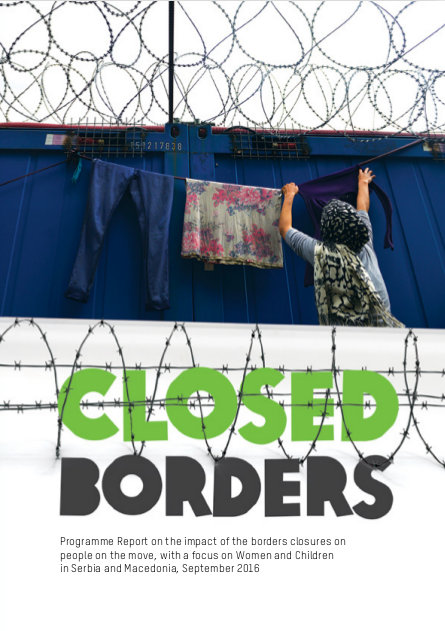Category Archives: Reports
AIDA Country Report: Serbia
Zusammenfassung:
Overview of the main changes since the first report. The first report was last published in March 2016:
-
Asylum reform: The adoption of the new Asylum Act, initially foreseen for 2016, has been postponed. The draft of the new Asylum Act has been shared with civil society representatives for comments, and was also received positively by the European Commission. The new law will introduce both accelerated and border procedures. Bearing in mind that the Asylum Office is understaffed even in light of the single existing procedure, it is reasonable to assume that additional personnel will be required to implement the additional proceedings. It is otherwise difficult to envision adequate implementation of the new law in reality.
Asylum procedure
-
Access to the territory: In July 2016, the Serbian Government adopted a decision to form mixed patrols of the army and police to strengthen the border with FYROM and Bulgaria. The Ministry of Defence reported in December 2016 that more than 18,000 migrants had been prevented from illegally crossing the border from Bulgaria. Between September and December 2016, the Belgrade Centre for Human Rights received 13 complaints concerning collective expulsions or push-backs to FYROM that involved approximately 750 persons. Those removed included people who had predominantly been residing in the reception centre in Preševo, as well as persons who had been intercepted by patrols of the police or army at the border, or mixed patrols deeper within the territory of Serbia.
Reception conditions
-
Accommodation: By the end of 2016, more than 7,000 people were residing in Serbia, the vast majority of whom (around 82%) were accommodated in camps along the border where they were waiting for their turn to be admitted into Hungary. The remainder stayed in the streets of Belgrade and border areas with Hungary.
-
The Ministry of Interior opened additional temporary reception centres to respond to the increase in refugees and migrants.
Content of protection
-
Integration assistance: In December 2016, a Decree on the Manner of Involving Persons Recognized as Refugees in Social, Cultural and Economic Life (“Integration Decree”) was enacted and entered into force in January 2017. The Decree foresees assistance various areas crucial to integration such as access to the labour market and education, including assistance in recognition of qualification and language courses. The Decree only refers to recognised refugees and does not explicitly cover subsidiary protection beneficiaries. However, due to its entry into force in January 2017, it remains to be seen how it will be implemented in practice.
Pushed back to Serbian winter: 1,600 cases of alleged push-backs in last two months
Save the Children released a statement this week showing that 1,600 cases of push backs from Hungary and Croatia to Serbia have taken place during the last two months. Push backs to Serbia have previously been reported by the Asylum Information Database (AIDA) and Human Rights Watch, and are regularly recorded by UNHCR.
HRW: Asylum Seekers Left in the Cold
Temperatures in Hungary and Serbia have dropped to minus 20 degrees centigrade at night. Yet nearly 2,000 asylum seekers and migrants are sleeping rough in Belgrade, in front of Hungary’s “transit zones” on the Serbian border, or inside a tattered government-run tent camp in Hungary without enough aid.
The impact of the borders closures on people on the move, with a focus on women and children in Serbia and Macedonia
This paper provides an analysis of the protection concerns that people on the move, especially women and children, face in Macedonia and Serbia following the closure of the Balkan route and presents recommendations on how to protect and promote their safety, dignity and human rights. This report was conducted by Oxfam and its partners: the Belgrade Center for Human Rights (BCHR) and Atina in Serbia, and the Macedonian Young Lawyer Association (MYLA) and Open Gate/ La Strada in Macedonia. It is based on background research, information gathered by Oxfam partners in the course of their field work, interviews with women and focus group discussions, and meetings with NGO and civil society representatives.
Evictions start in Belgrade: enforced mass transfers from Belgrade to Preševo
On November the 10th in the middle of the night, a big police operation took place behind the main bus station in Belgrade and the parking lot near the so-called “Afghan Park”. 109 people were put into buses and brought to the closed camp in Preševo near the Macedonian border. From here, people are being pushed back on a constant basis. Behind the bus station at the moment more than 700 refugees remain in empty warehouses and around 30 people are currently sleeping in the parking where night temperatures are at an average of 1 degree. During the whole operation, although the people were very scared, they stayed remarkably calm and peaceful. Police did not use actual physical force, but were sometimes deceitful towards the migrants by threatening them and lying over the buses’ destination in order to get them to move from the city.
Serbia’s South: Reception centre in Bujanovac, update Preševo Camp
Until March this year, the camp in Preševo was the entry point for thousands of people from Macedonia into Serbia on their way North. Now, it turned into the opposite: the last stop in Serbia before people are pushed back south, to Macedonia. For several weeks now, the Serbian police has been bringing people on the move to the now closed reception centre in Preševo. These are people that have been staying in camps in the North before, for example in Subotica and Sid as well as in Belgrade. Many people have launched their asylm process in Serbia. Nonetheless, they are pushed-back by the Serbian authorities. It is reported that the Serbian authorities destroies their asylum papers in order to destroy all prove that these people have been in Serbia before. The push-backs are against the all international conventions and violate the asylum right of these people. The push-backs appear to happen in large numbers to make space in the reception centres, as Serbia has not enough spaces in reception centres for all the people currently stranded in Serbia. Except for few unaccompanied minors and families all people who are brought to Preševo camp are subsequently pushed-back to Macedonia. Those vulnerable families and minors have been transferred to a new camp in Bujanovac, 20km north from Preševo.
Recent Repression on People on the Move in Serbia
Since the 15th of July, the day that prime minister Aleksandar Vučić held a speech [1] about the problems Serbia is facing at the moment, the situation in Serbia for people on the move has become more and more tense. The speech was an awaited response to the legal changes made in Hungary on July 5th (“8 kilometer” push-back law [2]) which set a legal frame for the Hungarian authorities to push back thousands of people to Serbian territory.
Among other points, Vučić mentioned in his speech that migrants are one of the biggest problems Serbia is facing at this time and that more repressive measures will be taken in order to gain control over the irregular movement of people. One of the measures put into practice has been a “joint venture” of police and military in order to guard the southern borders towards Macedonia and Bulgaria. As of August 30, 4,428 people have been kept from entering Serbia by military and police units, while within the same operation 673 who were encountered on Serbian territory have been brought to official reception centers[3]. The military officials don’t use the word ‘push-back’ or mention any direct contact with the groups, rather they state that people “gave up” when they saw the Serbian forces. Thereby, Serbia maintains its humanitarian vocabulary used to distinguish itself from other Balkan countries like Hungary and Macedonia who boast with numbers of people they successfully pushed back. Which methods were used to deter people and why these 4,428 people did not apply for asylum in Serbia but instead went back is not mentioned. Probably the mere sight of a police officer is not enough to stop people from moving on, yet their stories and voices remain silent and invisible.
On the one hand, this increasingly repressive policy changes can be seen as a national answer to the reality that was created by the northern neighbour Hungary and to the fact that from one day to the other people got stuck in Serbia with no option to move on. On the other hand, these changes can also be seen in the frame of a European Border Regime that consists of more than just the legal closure of European borders. This will be elaborated in the following.
Continue reading Recent Repression on People on the Move in Serbia
Pro Asyl: Misshandlungen und brutales Zurückdrängen an der Grenze
HRW (Human Rights Watch) berichtet, dass Schutzsuchende, die irregulär die Grenze nach Ungarn überquert hatten, ohne Prüfung ihrer Schutzbedürftigkeit gewaltsam nach Serbien zurückverbracht worden seien. Insgesamt befragte die Organisation 41 Schutzsuchende, NGO- und UNHCR-Mitarbeitende, Anwält*innen, Aktivist*innen und Beamte des Ungarischen Büros für Einwanderung und Nationalität (OIN). Unter den Befragten waren 12 Schutzsuchende – darunter auch Frauen und Kinder –, die auf ungarischem Territorium bei dem Versuch aufgegriffen wurden, irregulär einzureisen. Die Betroffenen berichteten, von Beamten brutal geschlagen, misshandelt und zurück nach Serbien verbracht worden zu sein. Es seien sogar Hunde auf sie losgelassen worden, Beamte hätten sie getreten und mit Stöcken und Fäusten geschlagen.
Human Rights Watch: Migrants abused at the Border
13.07.2016 | Human Rights Watch
(Budapest) – Migrants at Hungary’s border are being summarily forced back to Serbia, in some cases with cruel and violent treatment, without consideration of their claims for protection, Human Rights Watch said today.
New laws and procedures adopted in Hungary over the past year force all asylum seekers who wish to enter Hungary to do so through a transit zone on Hungarian territory, to which the government applies a legal fiction claiming that persons in the zone have not yet ‘entered’ Hungary. Human Rights Watch found that while some vulnerable groups are transferred to open reception facilities inside Hungary, since May 2016 the Hungarian government has been summarily dismissing the claims of most single men without considering their protection needs.
“Hungary is breaking all the rules for asylum seekers transiting through Serbia, summarily dismissing claims and sending them back across the border,” said Lydia Gall, Balkans and Eastern Europe researcher at Human Rights Watch. “People who cross into Hungary without permission, including women and children, have been viciously beaten and forced back across the border.”


